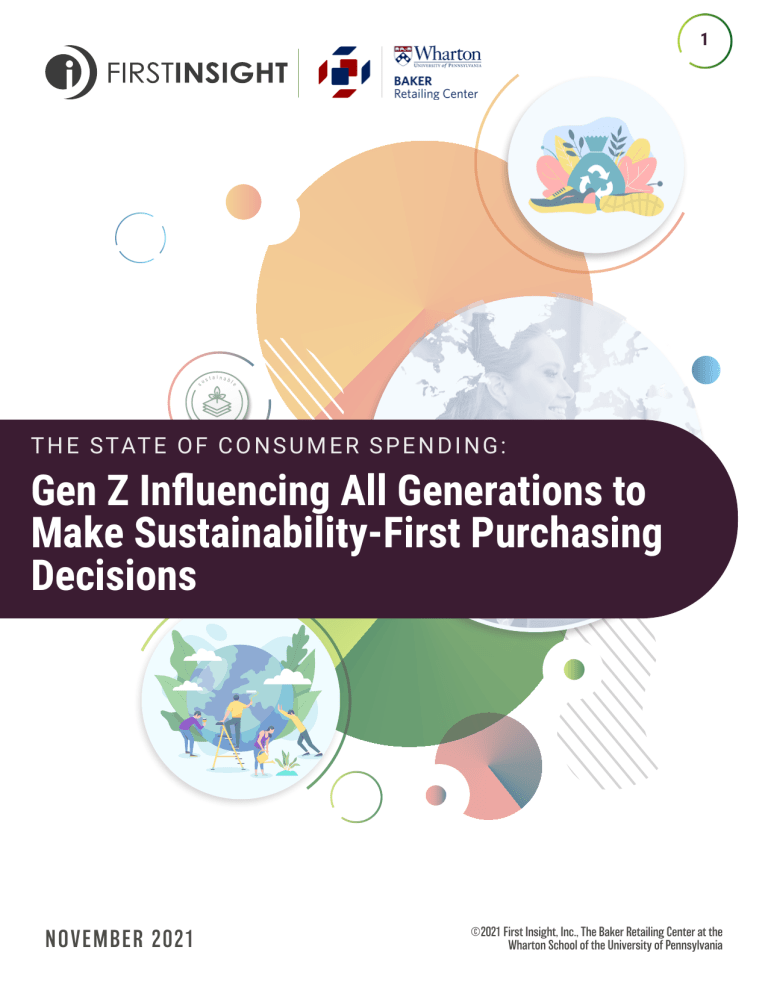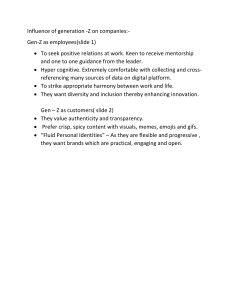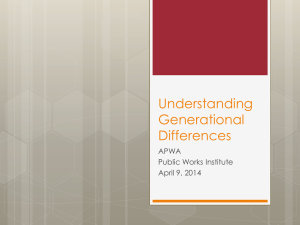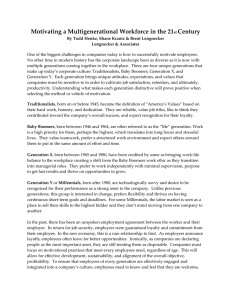
1 su sta inab le fab rics T H E S TAT E O F C O N S U M E R S P E N D I N G : Gen Z Influencing All Generations to Make Sustainability-First Purchasing Decisions NOVEMBER 2021 ©2021 First Insight, Inc., The Baker Retailing Center at the Wharton School of the University of Pennsylvania THE STATE OF CONSUMER SPENDING | GEN Z INFLUENCING ALL GENERATIONS TO MAKE SUSTAINABILITY-FIRST PURCHASING DECISIONS First Insight and the Baker Retailing Center at the Wharton School of the University of Pennsylvania surveyed consumers in the U.S. on how sustainable practices are impacting shopping habits and purchase decisions. The results point to the growing adoption for sustainable purchases, with Generation Z influencing other generations towards sustainability. The study found that: 1. Generation Z is influencing the older generations to place more importance on sustainability in their purchasing decisions. 2. The vast majority of Generation Z shoppers say sustainability is more important than brand name when making purchase decisions. 3. Generation Z’s influence over their Generation X parents shows a significant increase over two years ago on preference to shop sustainable brands and willingness to pay more for sustainable products. 4. The majority of respondents across every generation expect retailers and brands to become more sustainable. 5. Older generations including Baby Boomers, Generation X, and Millennials are disconnected with Generation Z on what sustainability actually means. 6. The majority of respondents across every generation continue to consider sustainable packaging as important. 7. Men, Generation X, Millennials and Generation Z are the most likely to make purchase decisions based on values (personal, social, and environmental). 8. Every generation except for Baby Boomers ranks quality over environmental concern when asked why they shop sustainable brands. First Insight and the Baker Retailing Center at the Wharton School of the University of Pennsylvania’s findings are based on the results of a U.S. consumer study of a targeted sample of more than 1,000 respondents fielded in July 2021. The study was completed through proprietary sample sources among panels who participate in online surveys. The findings have been compared to First Insight consumer data fielded previously in December 2019 and published in the report, The State of Consumer Spending: Gen Z Shoppers Demand Sustainable Retail. 2 THE STATE OF CONSUMER SPENDING | GEN Z INFLUENCING ALL GENERATIONS TO MAKE SUSTAINABILITY-FIRST PURCHASING DECISIONS 3 S U S TA I N A B I L I T Y B E AT S O U T B R A N D N A M E O F P R O D U C T A C R O S S A L L G E N E R AT I O N S Three-quarters of Generation Z consumers state that sustainability is more important to them than brand when making purchase decisions. Seventy-five percent of Generation Z survey participants prefer sustainability over brand name of product, and 71 percent of Millennials, 73 percent of Generation X and 65 percent of Baby Boomers agree. HOW DO YOU RATE THE IMPORTANCE OF THESE FACTORS WHEN MAKING A PURCHASE? 80% 65% 70% 60% 66% 73% 75% 71% 61% 54% 49% 50% 40% 30% 20% 10% 0% Baby Boomers Generation X Brand Name of Product Millennials Generation Z Sustainability G E N E R AT I O N Z I N F LU E N C I N G O T H E R G E N E R AT I O N S T O S H O P A N D S P E N D M O R E O N S U S TA I N A B L E B R A N D S Sixty-seven percent of Generation X survey participants prefer to buy from sustainable brands, a 24 percent increase from our last consumer sustainability report published in January 2020. PREFER TO BUY FROM SUSTAINABLE BRANDS 80% 67% 70% 60% 50% 40% 67% 62% 45% 62% 55% 54% 39% 30% 20% 10% 0% Baby Boomers Generation X 2021 Data Millennials 2019 Data Generation Z THE STATE OF CONSUMER SPENDING | GEN Z INFLUENCING ALL GENERATIONS TO MAKE SUSTAINABILITY-FIRST PURCHASING DECISIONS Consumers across all generations are willing to spend more for sustainable products compared to two years ago. Generation X, commonly parents to Gen Z’ers, had the highest increase (42 percent) in willingness to pay more for sustainable products. All generations are willing to spend an additional 10 percent or more on sustainable products compared to data fielded in 2019. Baby Boomers increased by 230 percent, Generation X increased by 159 percent, Millennials increased by 72 percent and Generation Z increased by 50 percent. ARE YOU WILLING TO PAY MORE FOR SUSTAINABLE PRODUCTS? 100% 60% 68% 78% 58% 40% 51% 17% INCREASE 80% 72% 68% 71% 73% Millennials Generation Z 55% 42% 20% 0% Overall Baby Boomers Generation X 2021 Data 2019 Data WILLING TO SPEND AT LEAST 10% MORE FOR SUSTAINABLE PRODUCTS 23% 34% 81% 50% 54% 20% 0% Baby Boomers Generation X 2021 Data Millennials 2019 Data Generation Z 50% INCREASE 40% 86% 159% INCREASE 60% 230% INCREASE 80% 88% 76% 72% INCREASE 100% 4 THE STATE OF CONSUMER SPENDING | GEN Z INFLUENCING ALL GENERATIONS TO MAKE SUSTAINABILITY-FIRST PURCHASING DECISIONS E V E R Y G E N E R AT I O N E X P E C T S B R A N D S T O B E C O M E M O R E S U S TA I N A B L E Respondents across generations expect retailers and brands to become more sustainable, according to 73 percent of Baby Boomers, 77 percent of Generation X, 79 percent of Millennials, and 76 percent of Generation Z. DO YOU EXPECT RETAILERS AND BRANDS TO BECOME MORE SUSTAINABLE? 100% 80% 79% 77% 73% 76% 60% 40% 27% 23% 24% 21% 20% 0% Baby Boomers Generation X Yes Millennials Generation Z No D I S C O N N E C T A C R O S S G E N E R AT I O N S A B O U T W H AT S U S TA I N A B I L I T Y A C T U A L LY M E A N S The majority of Baby Boomers (44 percent), Generation X (48 percent), and Millennials (46 percent) believe that sustainability means products made from recycled, sustainable, and natural harvested fibers and materials but Generation Z (48 percent) believes that sustainability is more about sustainable manufacturing. WHAT DOES SUSTAINABILITY MEAN TO YOU? 60% 50% 40% 44% 48% 46% 41% 33% 40% 48% 43% 30% 32% 34% 33% 30% 21% 20% 10% 19% 27% 27% 22% 29% 29% 31% 0% Products Made From Sustainable Manufacturing Recycled, Sustainable, and Natural Harvested Fibers and Materials Baby Boomers Sustainable and Efficient Shipping Practices Generation X Millennials Sustainable and Minimal Packaging Generation Z Environmental Responsibility 5 THE STATE OF CONSUMER SPENDING | GEN Z INFLUENCING ALL GENERATIONS TO MAKE SUSTAINABILITY-FIRST PURCHASING DECISIONS S U S TA I N A B L E PA C K A G I N G C O N T I N U E S T O B E I M P O RTA N T A C R O S S G E N E R AT I O N S The majority of respondents across generations continue to consider sustainable packaging as important, with a 34 percent increase of Baby Boomers, 44 percent increase of Generation X, 30 increase of Millennials, and 35 percent increase of Generation Z. IMPORTANCE OF SUSTAINABLE PACKAGING 50% 50% 40% 30% 52% 73% 57% 30% INCREASE 34% INCREASE 60% 44% INCREASE 74% 67% 70% 54% 35% INCREASE 75% 80% 20% 10% 0% Baby Boomers Generation X 2021 Data Millennials Generation Z 2019 Data M E N , G E N E R AT I O N X , M I L L E N N I A L S A N D G E N E R AT I O N Z M O S T L I K E LY T O M A K E P U R C H A S E S B A S E D O N VA LU E S It’s not just about finding the lowest price and best quality. Men (77 percent), Generation X (76 percent), Millennials (77 percent), and Generation Z (75 percent) are the most likely to make purchase decisions based on values that are personal, social, and environmental. A lower 67 percent of women and 58 percent of Baby Boomers say the same. PURCHASE DECISIONS BASED ON VALUES (PERSONAL, SOCIAL, AND ENVIRONMENTAL) PURCHASE DECISIONS BASED ON VALUES (PERSONAL, SOCIAL, AND ENVIRONMENTAL) 78% 77% 90% 76% 80% 74% 70% 72% 60% 70% 67% 68% 66% 76% 77% 75% Generation X Millennials Generation Z 58% 50% 40% 30% 64% 20% 62% Men Women Men Women 10% 0% Baby Boomers 6 THE STATE OF CONSUMER SPENDING | GEN Z INFLUENCING ALL GENERATIONS TO MAKE SUSTAINABILITY-FIRST PURCHASING DECISIONS M A J O R I T Y O F G E N E R AT I O N S R A N K Q U A L I T Y A S R E A S O N T H E Y S H O P S U S TA I N A B L E B R A N D S When asked why they shop sustainable brands, respondents rank quality higher than environmental concern across most generations except Baby Boomers. Thirty-six percent of Generation X, 37 percent of Millennials, and 31 percent of Gen Z rate it as important. Environmental concerns rank a bit lower, with only 23 percent of Baby Boomers, 36 percent of Generation X, 32 percent of Millennials and 22 percent of Generation Z respondents citing them as important. WHY DO YOU CHOOSE TO SHOP SUSTAINABLE BRANDS? 40% 29% 30% 37% 32% 30% 32% 31% 27% 25% 23% 22% 26% 24% 22% 20% 19% 19% 20% 15% 36% 34% 35% 17% 13% 13% 16% 21% 18% 16% 16% 14% 16% 12% 11% 9% 10% 21% 8% 5% 0% Brand Authenticity Environemntal Concern Quality Value Baby Boomers Generation X Craftsmanship Millennials My personal values Pricing Durability Generation Z CONCLUSION First Insight and the Baker Retailing Center at the Wharton School of the University of Pennsylvania surveyed consumers in the U.S. on how sustainable practices are impacting shopping habits and purchase decisions. The new study reveals the growing influence and power that Gen Z has over other generations towards sustainable retail. With Generation Z’s spending power estimated at up to $323 billion, retailers and brands must remain committed to sustainability practices to stay on the path forward for retail’s sustainable future and growth. 7 CONTACTS FIRST INSIGHT Gretchen Jezerc SVP of Marketing gretchen.jezerc@firstinsight.com BAKER RETAILING CENTER Mina Fader Managing Director faderm@wharton.upenn.edu MEDIA Stacy Berns sberns@bcg-pr.com • Michael McMullan mmcmullan@bcg-pr.com Berns Communications Group | (212) 994-4660 ABOUT FIRST INSIGHT First Insight is one of the world’s leading Experience Management (XM) platforms that empowers companies to significantly incorporate the Voice of the Customer into the design, pricing, planning and marketing of products and service offerings. Through the use of online consumer management tools, the First Insight platform gathers real-time consumer data and applies predictive analytic models to create actionable insights to power decisions which drive measurable value. Customers include some of the world’s leading vertically integrated brands, sporting goods companies, department stores, consumer products companies, mass merchant retailers and wholesalers. For further information, please visit www. firstinsight.com. ABOUT THE BAKER RETAILING CENTER AT THE WHARTON SCHOOL OF THE UNIVERSITY OF PENNSYLVANIA The Jay H. Baker Retailing Center is an industry research center at the Wharton School of the University of Pennsylvania. The Center develops insights, through programs and resources, with our faculty, students, and industry leaders that influences industry research and encourages discussion on trending retail topics. Our faculty are world-renowned researchers, and our board members are globally recognized omnichannel and direct to consumer brands and retailers. The center was established in 2002 through a generous gift from Jay and Patty Baker. Jay Baker, former President and Director of the Kohl’s Corporation, is a 1956 graduate of the Wharton School. Learn more about the Wharton/Baker Retailing Center. ©2021 First Insight, Inc., The Baker Retailing Center at the Wharton School of the University of Pennsylvania






